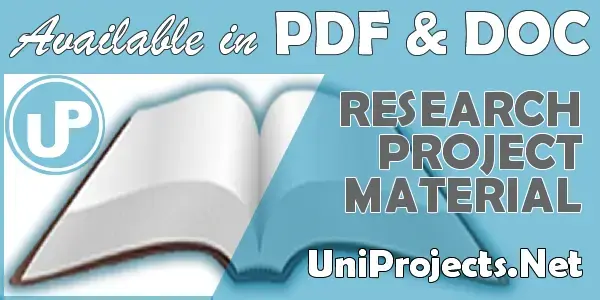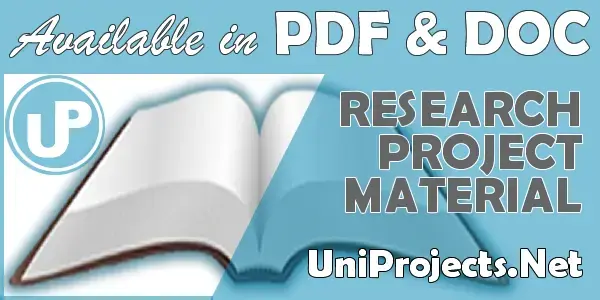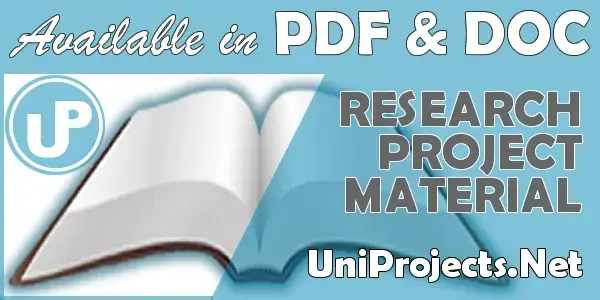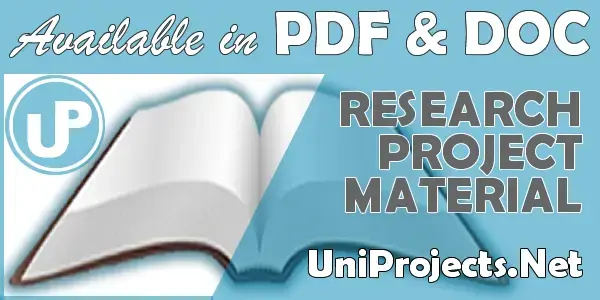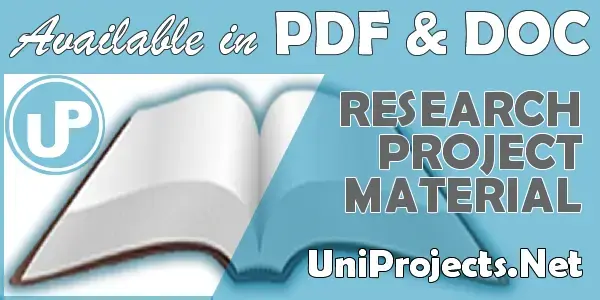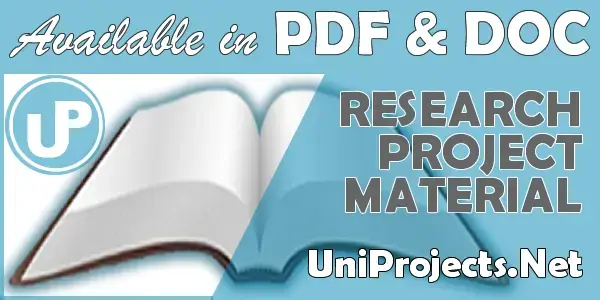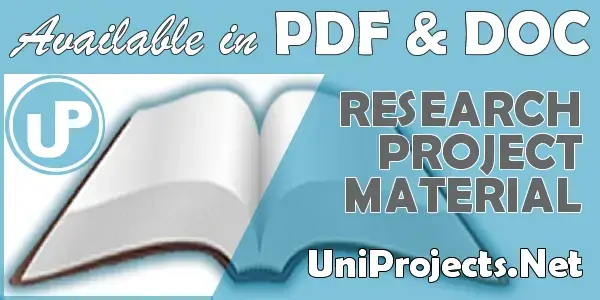Relationship Between Information Accessibility, Knowledge Acquisition And Management And Transfer System Among Traditional Herbal Medical Practitioners
Chapter One
INTRODUCTION
1.1 Background to the Study
Various countries of the world have claimed that health care policies geared towards improvement of the health status of their populations is through traditional or herbal medical system. This is borne out of the fact that good health care is instrumental for the well-being of every citizen and subsequently the socio-economic development of their various societies.
Traditional herbal medicine according to World Health Organization (2002), is the sum total of all knowledge and practices, whether explicable or not, used in diagnosis, prevention and elimination of physical, mental, or social imbalance relying exclusively on practical experience and observation handed down from generation to generation whether verbally or written. Traditional medical practitioner on the other hand according to WHO (2013) means a person who is recognized by the community as someone versatile and competent to provide health care by using animal, plant and mineral substances and other methods based on social, cultural and religious practice. However, there are strong indications that traditional health care systems are still in use by majority of the people not only in Africa but across the world (Cook, 2009). The traditional health care system has continued to thrive not only in the rural areas where over 70 per cent of the population live but also in the urban centers which have greater access to orthodox medical facilities. The stiff opposition to traditional medical practice from official quarters has not whittled down its level of patronage by the people simply because it was developed in response to the dictates of their environment. Examples of traditional medical practitioners are herbalists, diviners, faith healers, traditional surgeons etc. All these traditional medical practitioners need information to support their work.
Traditional medicine plays important roles in human society from past centuries to date. Traditional medical practice illustrates the medical knowledge practices, which improved for several centuries ago within a variety of societies before the era of modern Allopathic or Homopathic Medicine began (Alam 2011). He went further to say that among non-industrialized societies, the use of herbal medicine to heal disease is almost universal. People from countries in Latin America, Asia, Africa, even North America are still using herbal products to fulfill their regular health related necessities. Adesina (2014) supported Alam (2011) notion by showing that nearly 75-80 percent of the population in Africa uses traditional medicine to heal diseases and some other forms of ailment like cancer, HIV/AIDs, infertility, sickle cell, anemia and so on. Owing to the fact that traditional medicine is relevant, accessible, affordable, culturally acceptable and easy to prepare with little or no side effects, most people prefer it to the exorbitantly priced health care services. Herbal remedies for problems like urinary tract infection, pubertal changes, post-menopausal syndrome, hot flushes, menopause, poly cystic ovarian syndrome, bacterial vaginosis, yeast infections, infertility, delayed labor, low breast milk production, abortion and other female disorders. Women have handed down information from mother to daughter on how herbs can remedy some of the common maladies of life. Women, like the moon, change in cycles
Ramasubramania (2015).
Consequently, the knowledge on traditional health care system which is the panacea and first-front for all forms of health care system in the global gradually diminish as it became difficult to access, acquire and managed among herbal medical practitioners. Hence, low information accessibility, knowledge acquisition, knowledge management and transfer system among traditional herbal medical practitioners is the major constraints in the realm of herbal medical profession Okwor, Ihekwoaba and Ugwuanyi (2014).
Information seems to be crucial and never sufficient unless it adequately acquired and transferred. Information, according to (Carstensil 2010), is the data that is accurate and timely specific and organized for a purpose, presented within a context that gives it meaning and relevance, and can lead to an increase in understanding and decrease in uncertainty. Information is indispensable for effective management and development of traditional herbal medical practice and therefore considered as an important operational asset or resources. The world is currently in the age of advanced Information and Communication era. The world has become a global village; information therefore makes what goes on in any part of the world known and accessible to the rest of the world. The relevance of information to the people in the community cannot be undermined because it keeps people aware of what is going on in a given society and thus help an individual to have firsthand knowledge about certain issues. In this 21st century, traditional medical practitioners cannot be adequately effective without information, because such information about herbal medical practice is step down from one generation to another generation. Therefore, information is crucial to ensure continuity of herbal medical practice.
Information is concerned with sending of message, ideas, knowledge from one person to another. However, information changes the world we live in and the way we learn to live, cure and protect people’s life Rai (2015) Accordingly, information accessibility changes the face of traditional herbal medical practice through its potential as a source of knowledge acquisition; information accessibility is a medium to transmit traditional herbal medical contents and management on transfer system. Thus, information is both a cause of change and a means of achieving change, especially in the realm of herbal medical practice.
Research have shown that knowledge and information on herbal medical practice is usually convey from one generation to another generation through documents, folktales, oral tradition, books or record keeping, brainstorming, internet, tape record, television show and video record. The importance of information accessibility, knowledge acquisition, and management and transfer system among indigenous people cannot be over emphasized. Ibegwan (2013) opined that information need for herbal medical practitioners has three components. These are: information that is needed for decision making and that is already known by the health professional which is referred to as currently satisfied needs. The second component is the information that is known to the health professional but that he/she recognizes it as being applicable to the decision making process. This refers to consciously recognized needs. The third component is the information that is important to the circumstances at hand but the health professional does not realize that it is applicable. This is referred to as unrecognized needs.
Traditional medical practitioners need information on how to acquire raw materials to be used for preparation of their traditional medicine and on how these knowledge will be transferred to their descendants; however many of the indigenous traditional medical practitioners in South West Nigeria are faced with problem of accessibility and acquisition of raw materials for the product of their traditional herbal medicine which they are to eventually transfer to their children. Traditional herbal medical practitioners in South West need more knowledge on how to transfer their skills to succeeding generation. Herbal medical practitioners are the people who deal with ancient and cultural based health care. They believe in treating series of diseases in traditional ways through the use of various herbs as laid down by their forefathers. This knowledge is transmitted mostly through the words of mouth by the elders in the community from generation to upcoming generation.
Traditional herbal medical practitioners according (Lemu, 2013) are the people who look at indigenous knowledge as the construction of reality and wish to lead the way of life and dwell in their environment. However, traditional herbal medical practitioners in South West Nigeria need more knowledge on how to transfer their skills to succeeding generations. However, they lack access to knowledge acquisition and management of their activities (Lemu, 2013). Aboyade, Ajayi and Asubiojo (2012) noted that factors which stimulated the acknowledgement of those involved in health care of patients have a set of right and responsibilities to be given a clear explanation of any treatment.
Information accessibility is a method of retrieving series of recorded information to solve health problems. It could be accessed from a book, oral tradition (words of mouth) or electronic resources, folklores, documents, files and through story telling. Erik (2011) posited in his study that the way in which local television news operates in the media markets are making information accessible and structuring interactive experiences in industry transitions into generations. Moreover, Oguntade and Ibegwan (2011) posited that all the information specialists on health verifying, understanding and meeting the information needs of the health workforce. This is to ensure evidence based health care and ensure professional job satisfaction as part of a broader supportive environment of those values and motives of the health practitioners. Other ways of meeting the information needs of herbal medical practitioners include the provision of training in information utilization skills to the health care provider including the retrieval, critical appraisal, synthesis and opportunities for personal and group study in the library to support learning from peers, continuing education and professional development.
Moreover, information accessibility enriches traditional herbal medical practitioners because it is through it that more information on: traditional medicine, series and of herb and diseases it cures are obtainable. More so, access to information on traditional herbal medical practitioners will promote the practice, motivating the practitioners and so also invite more people to have interest in the practice which will in turn lead to recognition of traditional medicine in curing series of disease in the community. Guarantee to fore father’s documentation are able through information accessibility. The information is accessed through many means which include: association meetings, notebooks, files, community leaders, brain storming, story- telling, tape record, television and Information Communication Technology. Therefore, information accessibility by traditional herbal medical practitioners is undertaken to ensure knowledge acquisition, knowledge management and knowledge transfer system.
However, it is only when information is accessible that knowledge acquisition can be enhanced by the practitioners.
Acquisition is defined as obtaining or getting one,s own exertions or qualities (New Oxford Dictionary( 2010).In this context acquisition implies the process of obtaining information materials for knowledge. Acquisition of knowledge by traditional herbal medical practitioners could be male, female, old and young practitioners. Knowledge acquisition to traditional herbal medical practitioners is a method of learning how to acquire traditional practices as laid down by the forefathers, so, that the longevity would continue and pass to the succeeding generations. However, according to McNamara, Danielle and Walter (2006), knowledge acquisition is integrally tied to how the mind organized the fundamental properties of human knowledge, as well as by considering the function of the desired information. The activities in acquisition of knowledge include: brain storming through association meetings, reading and learning from association meetings, record books, checking files of information sources, storytelling, teaching and learning, tape records, television, oral communication and information communication technology. More so, indigenous traditional knowledge resources are not like conventional resources that can easily be obtained from the market because their acquisition is always defined by the practices and structures within the culture that produce them. Often, traditional knowledge is acquired from membership of the culture. Dei, et’al (2012) posited that the precondition usually attached to the acquisition of traditional knowledge is often respect and recognition of the value of the practices in the culture. Traditional knowledge is handed dowm from one generation to another through symbols, art, oral narratives, story telling, wise sayings, riddles and dances. It has been observed that, this pattern operates among traditional herbal medical practitioners.
In accessing information, traditional knowledge sources are mostly not intact which makes their acquisition by libraries and traditional practitioners difficult. They are different from modern sources of information which are available in the market. Some local people may hardly part with their knowledge while others may entrust them to a trustee. It is on the basis of this that El- miskin (2007) suggested that the process of acquiring such items should incorporate confidence building measures and ethical conduct that will establish mutual trust. Similarly, the American Library Association (2010) core values recognized librarians as professionals with a social responsibility to provide and promote public access to information. Due to this, they should embrace and respect the diversity of cultures and develop sensitivity and care to advancement of culture as fundamental of librarianship. This will serve as a reminder of core library values and to provide access to materials without sacrificing individual liberty or respect for cultural differences.
These principles may advance the role of librarians as stewards of knowledge and cultural heritage. Consensus on these principles within the library community will establish the library voice advocating for reason and respect in national and international discussions concerning protection of access to unique creative works of traditional cultural expression. So, therefore, if cultural information on traditional medicine is to be acquired by Nigerian libraries and traditional herbal medical practitioners, there is the need to accord it the same respect as given by the owners. Since the essence of knowledge acquisition is to have positive reflect of the knowledge been acquired and to impact knowledge on generations to come in accordance, hence, the need for knowledge acquired to be properly managed.
Management is a way of utilizing resources at one’s disposal to meet the needs of the present organisation in order to achieve the intended objectives as expected for positive gains. According to Stephen, Olushola, Oludare and Ayodele (2015), management is the process of working with people and resources to accomplish organizational goals. Good managers do those things that are effective in order to achieve goals with minimum waste of resources, that is, to make the best possible use of money, time, materials and people to achieve a set goal.
Management can be said to be focused on the attainment of end result by means of the allocation and utilization of resources that is human, physical and fiscal by devising appropriate method of acquiring planning, organising preserving and guiding in accordance with the society’s needs. In the assertion of McNamara (2006), traditionally, the term management is described as the functions of planning, organising, leading and controlling (or coordinating) activities in an organisation. The tasks involve assembling forming logical units of works, defining their hierarchical structures, identifying staff requirements, assigning tasks and responsibilities, coordinating human, financial, physical, informational and other resources needed to achieve goals. After information is being accessed which metamaphorsed into knowledge management, the next stage therefore, is knowledge transfers to the generations for continuity of herbal medical traditional practices.
Successful knowledge management requires attention and engagement. This is why attention is needed for information at all time to attain quality knowledge. Knowledge management is based on role playing on the use of knowledge. However, people including traditional herbal medical practitioners receive knowledge through: interaction with each other, sharing knowledge as it is received from their forefathers, association meetings, information and communication technology (ICT). More so, it is natural for people to either hide what they know or fail to put their knowledge to effective usage. The acts is better explained in the words of Daneshgar and Bosanquet (2010) in the following posers: ‘if my knowledge is a valuable resource, why should I share it? if my job is to create knowledge, why should I put my job at risk by using yours instead of mine? But, people still share what they know as much as they freely adapt and use the knowledge of others. However, management of the acquired knowledge by the traditional herbal medical practitioners will lead to the process of coordinating the total activities of the organisation.
Transfer systems however is a process of sending messages containing useful information from one practitioner to another to signify of knowledge transfer of teaching. Transfer system in this context involves inculcation of incantation, enchantment, ritual, sacrifice through association meeting and record keeping. The knowledge on how an individual can be healed is majorly learnt or transferred from old herbalists to their offsprings for substance and continuity of herbal medical practice. Incantation on how certain illness can be cured is taught through incantation which is one of the major procedures or measures for remediation. Therefore, transfer system improved the knowledge of herbal medical practitioners because series of information is recorded in the audio and visual materials such as computer disk, radio, television cassette. However, Madu and Ezeani in Ahmed (2014) stated that application of information technologies in the 1960s for a variety of purpose, gave birth to information revolution. Libraries could not afford to avoid the great touch of these technologies. The ability of computer to carry out these library functions quickly, accurately and systematically makes it a useful tool. Their applications in libraries, commonly known as library automation, have indeed continued to ease and promote quick and timely access to and transfer of information resources that are found dispensed round the globe. According to Abidoye (2011), the utilization of emerging technologies in recent times in libraries worldwide has proved beyond reasonable doubt that a library, whatever its services, can perform better when facilities are adequately provided. This will enhance access to the content of the library, users can access and download current information through internet; and can search for the same information at the same time using different terminals, which is impossible through the traditional services rendered in libraries. The library system therefore plays significant role in this study. In view of the foregoing therefore, this study is to examine the relationship between information accessibility, knowledge acquisition and management and transfer system among traditional herbal medical practitioners in South West Nigeria.
1.2 Statement of the Problem
Access to relevant information, acquisition of adequate knowledge, and proper management and transfer of such knowledge are essential ingredients for the socio-economic development of a group, including traditional herbal medical practitioners. It has been observed, that despite the efficacy and potency of herbal medicine, the activities of the traditional herbal medical practitioners are mostly shrouded in secrecy. The knowledge that the traditional herbal medical practitioners acquired mostly perish with them when they die. This is due to the fact that they do not expose the knowledge to others. On some occasions, the knowledge they have has secretly divulged to their children, such children might show little or no interest in the practice of their fathers. In other words, there is a kind of restriction in knowledge. Moreover, there is little or no openness in their practices, other people could not pick up their materials and prescribe drugs for people, if they do, such drugs might not work. If the acquired knowledge is well managed with proper relevant information, the transfer of this knowledge will be done without hindrance.
However, a healthy nation therefore is a wealthy nation. It is a fact that the traditional herbal medical sector needs to be restructured to meet the health needs of the citizenry. This is due to the fact that, over the years, many people have little or no knowledge about series of diseases and problems that traditional medicine can cure. Many people have died of cancer diseases, many are suffering from tuberculosis, high fever, some people have bone fracture and some have been amputated due to accident, some people are barren due to infertility and other reproductive system problems, some have difficulties during child birth delivery which lead to still birth or caeserier section. All afore-mentioned can have solution and can be cured through traditional medicine . Dangbin and Davou (2008) observed that there has been a great contention by the people of the society over the roles of traditional medical practitioners. The discontentment borne out of the fact that there has been inadequate information on knowledge acquisition, management and transfer system among traditional herbal medical practitioners in Nigeria.
Several studies have been carried out on health and traditional knowledge by different researchers. Fagbola, (2013) conducted a study on pertinent knowledge of medicinal plants in Nigeria. The result findings show that medicinal plants are very essential for health care system in Nigeria. Also, Regassa (2013) studied on assessment of indigenous knowledge of medicinal plant practice and mode of service delivery in Southern Ethopia and they concluded that indigenous knowledge of medicinal plant practices and mode of service delivery was poor.
However, most of the previous studies like Fagbola (2013), Regassa (2013) and Olatoku (2008) carried out their study on indigenous knowledge of medicinal plants and many of these were conducted in a region other than South West Region. To this end, there is need to fill this part of neglected area, this study therefore would examine the Relationship Between Information Accessibility, Knowledge Acquisition and, Management and Transfer System Among Traditional Herbal Medical Practitioners in South West Nigeria.
1.3 Aims and Objectives of the Study
Aim
The Aim of the study is to examine the relationship between information accessibility, knowledge acquisition and management and transfer system among traditional herbal medical practitioners in South West, Nigeria.
Specifically, the study is designed to:
1. determine the information access on herbal medical practices among traditional herbal medical practitioners in South West Nigeria.
2. identify the sources of knowledge acquisition by herbal medical practitioners in South West Nigeria.
3. assess how information on knowledge acquired by the herbal medical practitioners are transferred in South West Nigeria.
4. investigate the management strategies adopted by herbal medical practitioners in South West Nigeria.
5. identify the relationship between information accessibility, knowledge acquisition on the traditional herbal medical practices in South West Nigeria.
6. examine the relationship between methods of knowledge transfers system on traditional herbal medical practices in South West Nigeria.
7. determine knowledge management as correlates knowledge transfer system among the traditional herbal medical practitioners in South-west Nigeria.
1.4 Research Questions
The following questions will guide the study:
1. How do traditional medical practitioners access information on herbal medical practitioners in South West Nigeria?
2. What are the sources of acquiring knowledge by traditional herbal medical practitioners in South West Nigeria?
3. How is the knowledge acquired by traditional medical practitioners transferred?
4. What are the strategies adopted by traditional herbal medical practitioners for managing acquired knowledge in South West Nigeria?
5. What is the relationship between information accessibility and knowledge transfer system among the traditional herbal medical practitioners in South West Nigeria
6. What is the relationship between knowledge acquisition and knowledge transfer system among the traditional medical practitioners in South West Nigeria.
7. How does knowledge management correlates knowledge transfer system among the traditional herbal medical practitioners in South West Nigeria.
1.5 Research Hypotheses
The following null hypotheses will be tested at 0.05 level of significance.
H01: There is no significant relationship between information accessibility and knowledge transfer system among the traditional medical practitioners in South West Nigeria.
H02: There is no significant relationship between knowledge acquisition and knowledge transfer system among the traditional herbal medical practitioners in South West Nigeria.
H03: There is no significant relationship between knowledge management and Knowledge transfer system among the traditional herbal medical practitioners in South West Nigeria.
H04: There is no significant relationship between knowledge acquisition and Knowledge transfer system among male and female traditional herbal medical practitioners in South West Nigeria.
H05: There is no significant relationship between information accessibility and knowledge transfer system among young and aged traditional medical practitioners in South West Nigeria.
1.6 Justification of the Study
The study on the relationship between information accessibility, knowledge acquisition, and management and transfer system among traditional herbal medical practitioners in South West Nigeria justification in the following ways:
i. This study would help to give an insight on the unique importance of herbal medical practice with respect to their inevitable contributions to the life of people in the community, thus, will make the traditional herbal medical practitioners gain more recognition.
ii. Findings from the study would assist the traditional herbal medical practitioners in preventing and curing of some sicknesses, which demand indigenous medical health care. There will be a sustainable emphasis by the government to have local authority or even an organization in the state to cater for the needs of traditional herbal medical practitioners in South West Nigeria. This will be of great advantage to the people of the States.
iii. Government would recognize the efforts of traditional herbal medical practitioners and incorporate them into the plan and implementation of the health programmes of the States.
iv. Furthermore, it would enable the people to be aware of the sicknesses which orthodox medical practitioners cannot handle.
v. It would enable the librarians to store and make available to the traditional herbal medical practitioners, information that they require in the practice of their health care services.
vi. It would serve as a source of reference to future researchers.
1.7 Scope of the Study
This study would examine the relationship between information accessibility, knowledge acquisition and management and transfer system among traditional herbal medical practitioners in South West Nigeria. The study comprised of all six states in South West geo-political zone with population of 4,409 traditional herbal medical practitioners in this zone while target population would be restricted to all Gyneacologists herbal medical practitioners (603) in the three randomly selected states: Ekiti, Osun and Oyo States in South West geo political zone.
One instrument would be used to elicit data from the respondents in this study titled FAKAMTSHMP with 50 items. Frequency and percentage would be used to analyse demographic background of the respondents while Pearson product moment correlation coefficient would be used to analyse all the research hypotheses.The field work will commence after the proposal defence and hope to complete the work as soon as possible.
1.8 Operational Definition of Terms
The following terms are defined as used in the context of the study:
Traditional Knowledge: This refers to the local knowledge that is unique to a given culture or society. In this study, it would refer to local knowledge that is unique to traditional herbal medical practitioners in South West Nigeria.
Traditional Medical Practitioners: These are traditional healers who provide health care services with local herbs according to customs and beliefs of the community in which they reside.
Information Accessibility: This refers to the way of getting available information resources in both print and non print formats through personal experience, teaching and learning; books; association meetings, storytelling and others on various herbal medicine and the diseases it can cure.
Knowledge Acquisition: Knowledge acquisition in this study means knowledge that can be obtained by traditional herbal medical practitioners from available information resources.
Knowledge Management: Refers to the way in which knowledge is captured, preserved and channelled properly by traditional herbal medical practitioners for effective utilization in present and future.
Knowledge Transfer System: Refers to all activities that generate utilisation, application or exploitation of knowledge and its movement from one place to another.
Chapter Two: Literature Review
2.0 INTRODUCTION:
This chapter provides the background and context of the research problems, reviews the existing literature on the relationship between information accessibility, knowledge acquisition and management and transfer system among traditional herbal medical practitioners, and acknowledges the contributions of scholars who have previously conducted similar research [rev25058] …
Table of Content
CHAPTER ONE
1.0 INTRODUCTION
1.1 Background to the Study
1.2 Statement of the Problem
1.3 Aim and Objectives of the Study
1.4 Research Questions
1.5 Research Hypotheses
1.6 Justification of the Study
1.7 Scope of the Study
1.8 Operation Definition of Terms
CHAPTER TWO
2.0 LITERATURE REVIEW
2.1 Conceptual Framework
2.2 Theoretical Framework
2.2.2 Choo Five Step Management Model Process
2.3 Importance of Traditional Knowledge in Nigerian Society
2.4 Method of Acquiring Information for Traditional Herbal Medical Practice
2.5 Information as an Important tool for Successful Practice of Traditional Herbal Medical System
2.6 The Importance of Preservation of Traditional Medicine
2.7 Method of Transfer of Information among Traditional Herbal Medical Practitioners
2.8 The Roles of Libraries and Librarians in the Information Acquisition Management and Transfer System among Traditional Herbal Medical Practitioners
2.9 Related Studies Concerning the Knowledge and Utilization of Traditional Herbal Medicine in African and Asian Societies
2.10 Resurgence in the Use of Traditional Knowledge and its Associated Genetic Resources
2.11 Summary of Literature Review
CHAPTER THREE
3.0 RESEARCH METHODOLOGY
3.1 Research Design
3.2 Population of the Study
3.3 Sampling Techniques and Sampling Size
3.4 Research Instrument
3.5 Validity and Reliability of Instrument
3.6 Trial Test
3.7 Data Collection Procedure
3.8 Method of Data Analysis
REFERENCES
APPENDIX A
Prevalidated Instrument
APPENDIX B
Validators’ comments
APPENDIX C
Calculation of trial test result i.e work sheet
Appendix D
Formula for calculating the trial test
